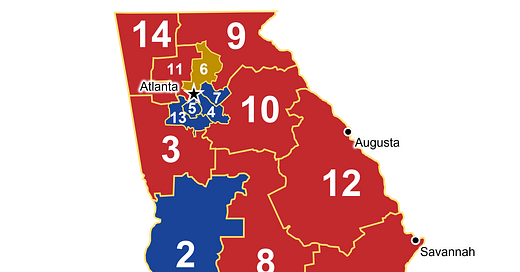Georgia: Problems with the Purcell Principle
After the Supreme Court effectively approved Alabama's map for 2022, Democrats in Georgia are wary of challenging their own state's new map.
Before We Start, What’s Going On in Alabama?
The U.S. Supreme Court put a hold on the recent federal court case that demanded Alabama redraw its congressional district maps for racial gerrymandering. While this decision doesn’t explicitly validate the maps in the eyes of the court, it does allow the map to stand for the upcoming 2022 election. The court is expected to hear arguments in the fall and release a decision months later. In defense of the stay, the majority cited the Purcell principle, an idea that courts shouldn’t make decisions that change election rules during the period just prior to an election.
This is What Systemic Racism Looks Like
The problem that many racial justice activists have with this action by the Supreme Court (myself included) is it provides a clear avenue for bad actors to advance discriminatory election laws as long as they do it in an undefined “period just prior to an election.” With this decision, even if the Supreme Court later rules that Alabama’s map is a racial gerrymander that needs to be undone, Republicans will already have succeeded in increasing their representation in the US House. It also places an undue burden on those who are discriminated against to time their cases perfectly. As most Americans loathe, there always seems to be another election right around the corner. There’s been heavy documentation of the ways our political process has transformed into a never-ending campaign cycle. Citing the Purcell principle as a defense against addressing a racial gerrymander gives politicians the ability to slow-walk redistricting legislation to ensure it wont be challenged the court. As we’ll see when reviewing Georgia’s redistricting process, that’s exactly what Republican legislators did.
New District Breakdown
Who’s In Control?
Republicans are in complete control of the redistricting process in Georgia as they hold majorities in all branches of state government. Republicans in the Georgia General Assembly originally passed the new districts in late November. The Governor then let the districts sit on his desk for a month before finally approving the new map on December 30. Opponents immediately filed three lawsuits, alleging that the new districts dilute the power of the state’s Black voters.
Attorneys defending the Republican-approved map claim that there’s no time to redraw new districts, therefore the court should let the map stand as is. Opponents point to the fact that they literally filed lawsuits as soon as was legally possible, yet that may still be considered too close to an election. Here lies the problem with applying the Purcell principle to these cases: if legislators purposefully wait until the last minute to pass voting legislation, they can effectively conduct unfair elections since court challenges must wait until after the election is over.




